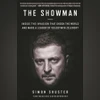THE SHOWMAN: Inside the Invasion That Shook the World and Made a Leader of Volodymyr Zelensky
Author: Simon Shuster
Publisher: William Morrow
Pages: 363
Price: $32.99
Nine months into Russia’s full-scale invasion of Ukraine, in 2022, the Time magazine correspondent Simon Shuster caught a ride on a presidential train that few, if any, journalists had seen from the inside. In a private carriage, with the blinds drawn, Volodymyr Zelensky was fuelling up on coffee during a trip to the frontline. He’d been reading about Winston Churchill, but with Shuster he’d sooner discuss another key World War II figure: Charlie Chaplin.
“He used the weapon of information during the Second World War to fight against fascism,” Zelensky said. “There were these people, these artists, who helped society. And their influence was often stronger than artillery.”
Also Read
It’s a telling moment in Shuster’s The Showman, an intimate account of the invasion’s early months, and it captures his thesis — that Zelensky’s effectiveness as a wartime leader is rooted in his skills as a performer, honed over more than two decades in the entertainment industry.
Shuster has been reporting from Kyiv since 2009. In 2019, he interviewed Zelensky the presidential candidate in the offices of his production company, Kvartal 95. Planting himself in Zelensky’s inner circle, Shuster shadowed him, on and off, through the first year of the war, a period that culminated in Zelensky’s address to the United States Congress; observing from a balcony, Shuster logged 13 standing ovations in his notes “before their frequency forced me to give up counting.”
In the space of less than three years, as Shuster vividly details, Zelensky transforms from a clean-cut funnyman into a war hero out of central casting, “an unlikely fashion icon” in his army-green fleece embroidered with the golden trident of the Ukrainian coat of arms. In the war’s opening hours, the Ukrainian president gets into character with a pep talk. “They’re watching,” he said to himself. “You’re a symbol. You need to act the way a head of state must act.”
Less than a week before the war, with 190,000 Russian troops on Ukraine’s doorstep, Western officials at a Nato summit in Munich had privately urged him to establish a government in exile.
Written off as a dead man walking, he elected to project strength, galvanising his fellow Ukrainians with the vigour of his rhetoric. Who can forget Zelensky’s brave pronouncement, recorded on his smartphone on the second night of war? “We’re all here,” he says into the camera, standing in the open air alongside four of his most trusted aides, “defending our independence, our country — that’s the way it’s going to be.”
It’s a testament to Zelensky’s diplomatic prowess that days after counselling him to negotiate the terms of his own surrender, Kyiv’s allies in the European Union assented to his appeal for arms, contravening their own policies against sending weapons into conflict zones. The bloc also barred Russian planes from its airspace, and the country’s largest creditors were expelled from the global banking system, effectively obstructing Moscow’s reach into its own military coffers.
Despite his limited experience as a statesman, Zelensky had won the West’s approbation and material support and he did it largely by seeking attention in the spirit of a SoundCloud rapper pushing a new single through TikTok: with incessant repetition. For months, he delivered daily speeches, often via video link from an underground bunker beneath his presidential headquarters in Kyiv.
While Shuster’s admiration for his subject is palpable, he never tips over into hagiography. He knows that Zelensky’s skill as an entertainer, and the tactical advantages it has conferred in global politics, do not sufficiently explain the complexities of his presidency. The same vehemence that drives Zelensky to dominate the information war is also what worries Shuster most.
Even before Vladimir Putin announced his “special military operation” in Ukraine, Zelensky had banned three television channels reportedly owned by a close associate of the Russian president. When Shuster presses Zelensky on this point, the president grows defensive, “his eyes shifting between anger and embarrassment.” Zelensky explains “with faint conviction in his voice” that Russia’s relentless disinformation campaign had already “brainwashed” a good number of Ukrainians in Crimea and the Donbas.
“The argument stank of paternalism,” Shuster concludes. After Russian tanks rolled into Kyiv’s suburbs, Zelensky suspended about a dozen political parties and revoked the citizenship of several former politicians. His government also prevailed on six major networks to jointly produce a round-the-clock programme called “Telemarathon United News,” which Zelensky has described as a “unified weapon on information” and which critics have recently dismissed as
state propaganda.
“Many lawmakers had begun to wonder whether he could handle the powers entrusted to him under martial law,” Shuster writes, “and whether he would ever be able to part with them.” Zelensky’s single-minded quest to control the narrative has led to concerns of creeping despotism.
Having spent more time with Zelensky during the fighting than perhaps any other reporter, Shuster comes to believe that Zelensky’s “highhandedness” is indeed a wartime exigency and not a harbinger of autocracy, even as he acknowledges that Zelensky granted him so much access precisely because he saw Shuster’s “work as useful to him as a means” to amplify his own talking points.
Shuster takes heart in small gestures of reticence. Ahead of Ukraine’s Independence Day in 2022, the country’s postmaster general visited Zelensky in his office and presented him with a mock-up of a postage stamp bearing his image. The president cringed. “It’s not the time,” he said, “to start a cult of personality.” The more pressing issue is whether Zelensky’s powers of persuasion — his showmanship — will be enough to sustain the West’s resolve until the end.
The reviewer is an editor at Foreign Affairs. ©2024 The New York Times News Service




)